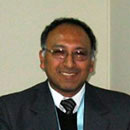Track on Applied Natural Language ProcessingRegister Now
Call for Papers
The availability and size of textual information have grown dramatically in different areas such as academic, work or individual. Emails, working papers, scientific articles or social media publications are some examples of large sources of data that are presented in natural language. This raises a challenge, since the language presents a type of unstructured data that contains ambiguity, among other properties that increase the difficulty in the processing task. In this context, there is a growing interest in improving the accessibility to information and its exploitation in different environments by companies and organizations. For all this, the applications of Natural Language Processing have become very important today.
SIMBig has become an important meeting point of computer scientists, computer engineers, software engineers, and application developers from around the world. The Applied Natural Language Processing (ANLP) track of SIMBig will provide a forum that brings both researchers and practitioners to discuss: research trends and techniques related to Natural Language Processing.
Scope and Topics
We plan to include all the important topics related to applied natural language processing within ANLP. The topics suitable for ANLP include, but not limited to:
- Machine Translation.
- Sentiment Analysis/Opinion Mining.
- Automatic Summarization.
- Plagiarism Detection.
- Language Detection.
- Natural Language Generation.
- Natural Language Interfaces.
- Natural Language Processing in Informal Texts.
- Question-Answering Systems.
- Content Analysis.
- Natural Language Processing for Education.
- Natural Language Processing for Low-Resource Languages.
- Bio-NLP.
- Dialogue Systems.
- Information Retrieval and Extraction.
- Event Detection.
- Text Classification and Clustering.
- NLP techniques for Internet of Things.
- Multilingual NLP.
- Ontology-based NLP.
Paper Submission Guidelines
Authors are invited to submit original and unpublished papers of research and applications for this track. Full papers should be between 5 to 10 pages (including references and figures). Papers should be written in English and submissions must be in PDF format following the instructions in Latex templates (ACL templates) available here:
Latex
Microsoft Word
CMT Submissions Website
Paper registration is required, allowing the inclusion of the paper in the conference proceedings. At least one author of each accepted paper MUST present the paper.
Paper registration and submissions to ANLP will be handled using the CMT system. The address to paper registration is here
Track Chairs

Marco Antonio Sobrevilla Cabezudo
PhD Student in Computer Science
Department of Computer Science, ICMC
University of São Paulo,
Email: msobrevillac@gmail.com

Félix Arturo Oncevay Marcos
Master in Informatics
Department of Informatics
Pontifical Catholic University of Perú
Email: arturo.oncevay@pucp.edu.pe

Armando Fermín Pérez
Electronic Engineer
Universidad Nacional Mayor de San Marcos
Email: fferminp@unmsm.edu.pe
Program Committe


